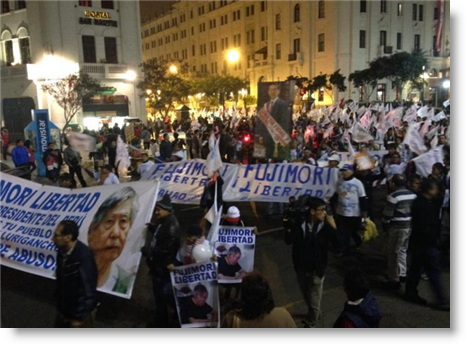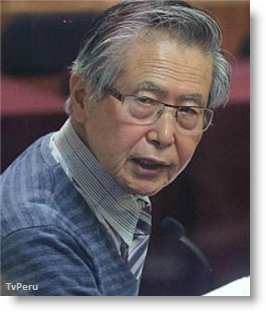 The Presidential Pardons Commission met this Monday to begin evaluating a request filed on Friday July 22 by ex-President Alberto Fujimori, who is serving a 25-year prison sentence for crimes against humanity.
The Presidential Pardons Commission met this Monday to begin evaluating a request filed on Friday July 22 by ex-President Alberto Fujimori, who is serving a 25-year prison sentence for crimes against humanity.
Also on Friday, hundreds of supporters were bussed into the Plaza San Martin for a rally and march to demand Fujimori’s pardon and release. The march was no match, however, to the thousands-strong protest against Keiko Fujimori’s presidential candidacy held just before the runoff election in June.
The release of Alberto Fujimori has been on his supporters’ agenda since his conviction in 2009. Yet despite Keiko Fujimori’s denial and silence on the subject in this presidential campaign, when her Fuerza Popular party won the majority of seats in Congress — 73 of 132— re-elected congresswoman Cecilian Chacón ecstatically shouted “Alberto Fujimori has to leave (prison) via the front door!”
But any hopes of pushing through Fujimori’s release were gone when his daughter lost the runoff election in June to Pedro Pablo Kuczynski, and since then there has been a push to get either President Ollanta Humala to grant a pardon within his final four or five days in office, or to get President-elect Kuczynski to announce such a decision at his inaugural address on July 28.
“I’m not going to pardon Alberto Fujimori,” President Humala told El Comercio Monday evening, adding that the pardons commission will need at least two months to fully assess the request and situation.
Outgoing Fujimorista congressman Julio Gagó, in what was criticized by some analysts as an attempt at blackmail, suggested last week that Kuczynski would have a much easier time ahead — “reconciliation and governance”— if he saw fit to pardon Fujimori.
“Alberto Fujimori has the right to ask for a pardon, but I won’t sign it,” said Kuczynski.
“Crimes against humanity are punished in the way ex-President Fujimori was punished. The fact that he is older and maybe ill could justify, not a pardon, but that he complete the sentence at home,” Kuczynski said in an interview with La Republica.
Instead, Kuczynski has mentioned several times that he would not object to signing into law a bill passed by Congress to grant house arrest for humanitarian reasons to prisoners over the age of 75 and who were not convicted for acts of terrorism.
The ball is now in Fuerza Popular’s court but, as journalist Rosa Maria Palacios points out, the Fujimoristas are not interested in house arrest, they want a full pardon and release from prison.
 This is the second time Fujimori has applied for a presidential pardon. The first was in late 2012. President Ollanta Humala turned down the request in June 2013 on several grounds — these included the legal arguments that, a law enacted by President Fujimori in 1995 denied pardon to anyone convicted on charges of kidnapping, and also that as a member of the Inter-American Court of Human Rights, Peru could not grant pardon for crimes against humanity. Additionally, a pardon for humanitarian reasons did not apply because, as a team of 12 physicians and two observers had confirmed, Fujimori was mentally fit and had no life-threatening or incurable disease. The final report also said that Fujimori did not recognize, regret or feel any remorse for the crimes he had committed.
This is the second time Fujimori has applied for a presidential pardon. The first was in late 2012. President Ollanta Humala turned down the request in June 2013 on several grounds — these included the legal arguments that, a law enacted by President Fujimori in 1995 denied pardon to anyone convicted on charges of kidnapping, and also that as a member of the Inter-American Court of Human Rights, Peru could not grant pardon for crimes against humanity. Additionally, a pardon for humanitarian reasons did not apply because, as a team of 12 physicians and two observers had confirmed, Fujimori was mentally fit and had no life-threatening or incurable disease. The final report also said that Fujimori did not recognize, regret or feel any remorse for the crimes he had committed.
Alberto Fujimori was extradited from Chile in 2007 to face several trials in Lima for crimes committed during his 1990-2000 administration. In 2009, he was convicted and sentenced to 25 years in prison for the La Cantuta and Barrios Altos murders and for the kidnapping in 1992 of journalist Gustavo Gorriti and Pucallpa businessman Samuel Dyer at the time that Fujimori closed the Congress. The former President was also found guilty of corruption in four other trials, but the sentences were shorter and under Peruvian law, sentences are not cumulative.
Fujimori is serving his sentences in a comfortable, individual facility of several rooms within the Police Special Operations headquarters in northeast Lima. He has few visiting restrictions, and between the months of August and October 2015, for example, he received 653 visitors. He has suffered at times from depression, and has been hospitalized several times for a non-cancerous growth in his mouth, and recently for gastritis.





